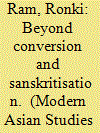| Srl | Item |
| 1 |
ID:
112482


|
|
|
|
|
| Publication |
2012.
|
| Summary/Abstract |
Given different socio-economic structures, and acute landlessness among the Dalits of East Punjab, the agendas of conversion to neo-Buddhism and sanskritisation, the two most popular Dalit social mobility models in India, have failed to strike a cord among the Dalits in this border state of northwest India. But that does not imply that Dalits of Punjab have failed in improving their social status. On the contrary, they have been very vocal in their assertions for social justice and dignity, and pressing for a due share in the local structures of power; a clear indication of a significant surge of Dalit social mobility in Punjab. The question that still remains largely unexplored, however, relates to the patterns of Dalit social mobility in Punjab that have emerged independently of the agendas of conversion to neo-Buddhism and sanskritisation. The study aims to map out the contours of an emerging alternative Dalit agenda in Punjab, which is conspicuous by its absence in existing Dalit studies, and examines its catalytic role in enhancing the legitimacy and effectiveness of increasingly visible Dalit social mobility in the state. The paper concludes by visualising the possibility of an articulation and assertion of a similar alternative Dalit agenda through highly contentious democratic politics in other parts of India, where the archetypical agendas of conversion and sanskritisation have either failed to deliver social justice and dignity or could not simply appeal to the local Dalit population.
|
|
|
|
|
|
|
|
|
|
|
|
|
|
|
|
| 2 |
ID:
190958


|
|
|
|
|
| Summary/Abstract |
This article foregrounds the postcolonial museum as a new source, and site, from which to write South Asian histories of partition and its aftermath. It focuses on collecting practices in India within East Punjab, following the partition of the British-era Punjab province in 1947 between India and Pakistan. Tapping hitherto-unused archival sources, it reveals the considerable financial investment and drive to collect at this time, belying the idea of museums being ‘dead’ colonial assets, and demonstrates their centrality to how citizenship and belonging were articulated (or withheld) in independent India. Some discoveries have far-reaching implications for both historians and museum professionals. The article also shines a light upon a new range of actors—both named and nameless, professional and citizen—who have been marginal to historical enquiry thus far. Moving beyond the familiar colonial templates within which museums in the region have until now been studied, it asks critical questions of the postcolonial museum in South Asia by interrogating the relationship between collections, and the Indian nation-state and its subsidiaries.
|
|
|
|
|
|
|
|
|
|
|
|
|
|
|
|